外研社八年级上册期中复习Module1-Module 6短语和重点知识点期中复习课件(共91张PPT)
文档属性
| 名称 | 外研社八年级上册期中复习Module1-Module 6短语和重点知识点期中复习课件(共91张PPT) | 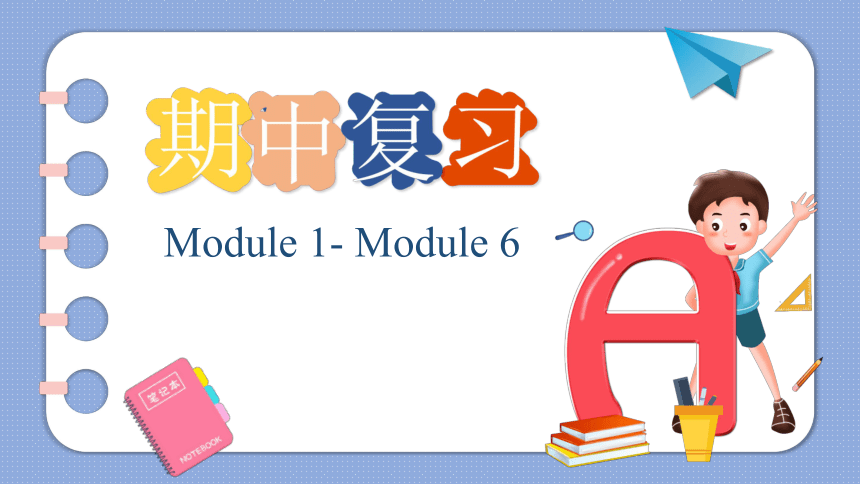 | |
| 格式 | zip | ||
| 文件大小 | 495.6KB | ||
| 资源类型 | 教案 | ||
| 版本资源 | 外研版 | ||
| 科目 | 英语 | ||
| 更新时间 | 2020-11-06 16:41:10 | ||
图片预览

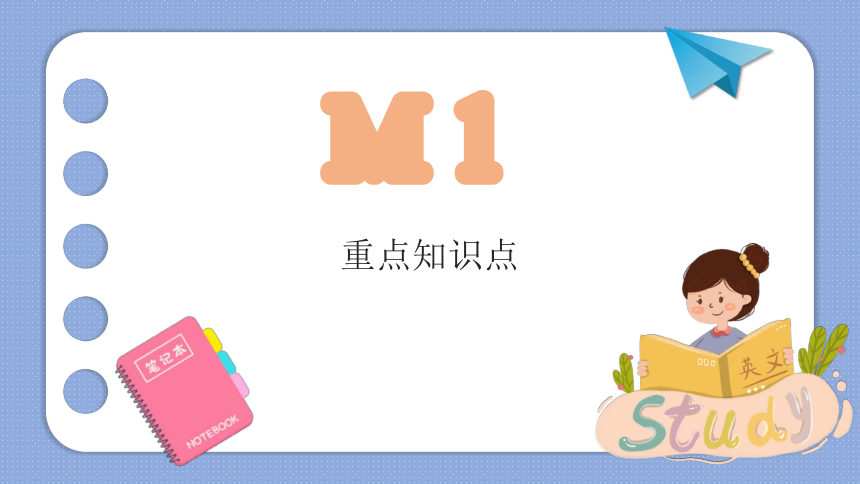
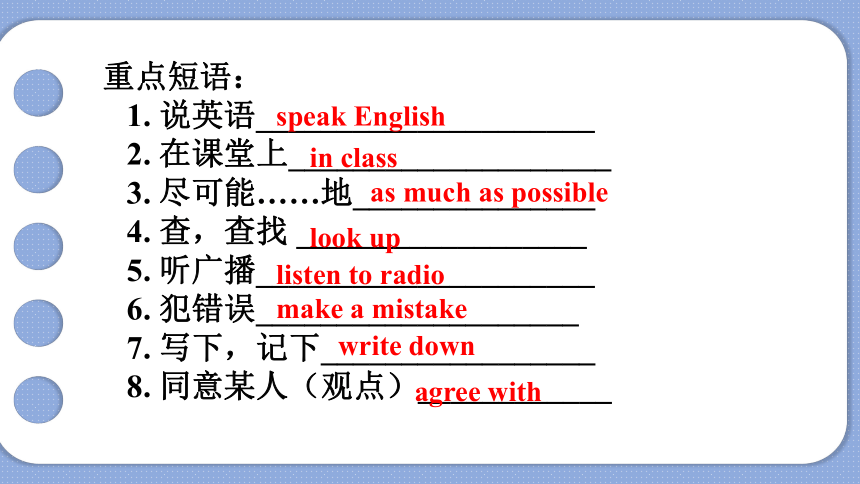
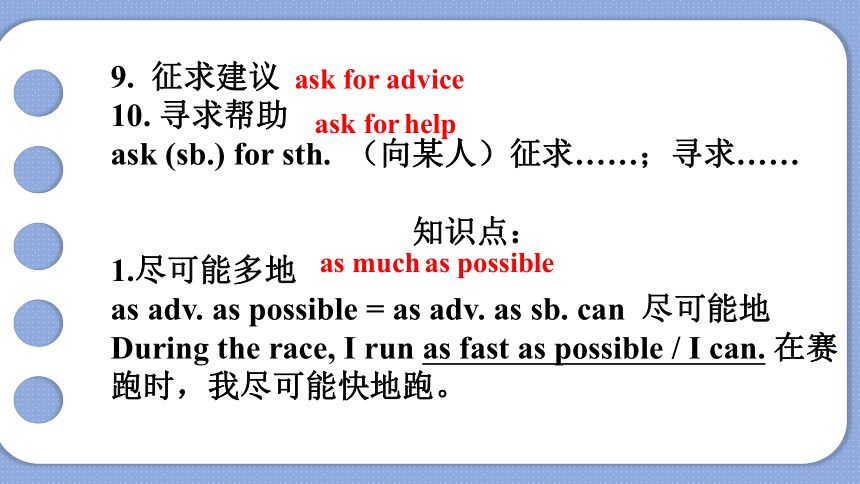
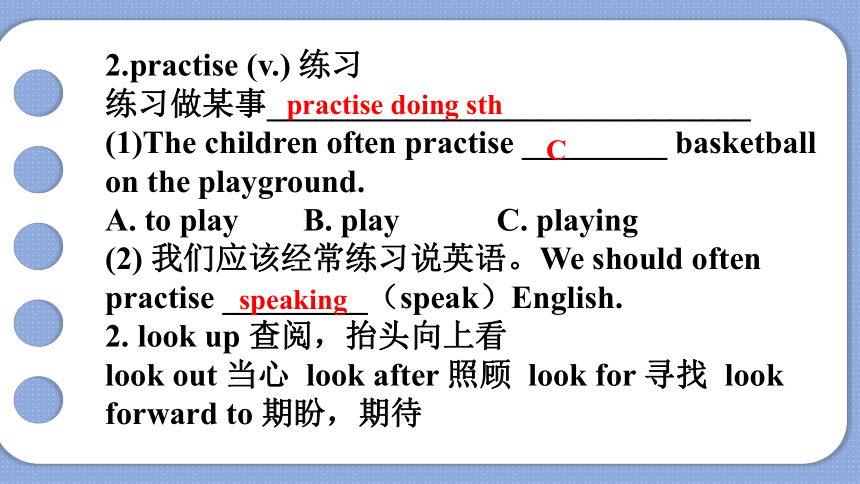
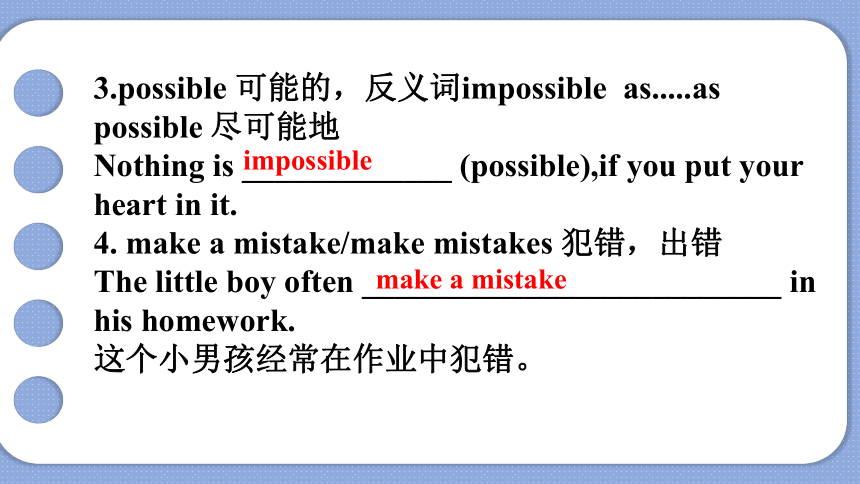
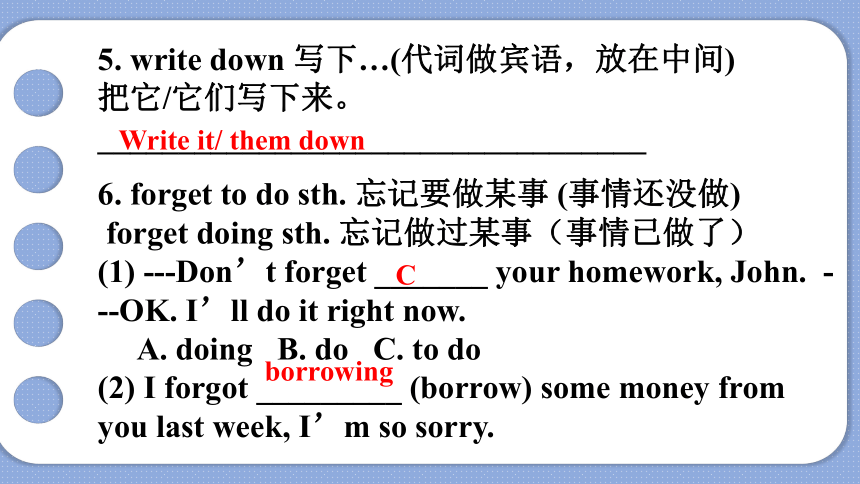

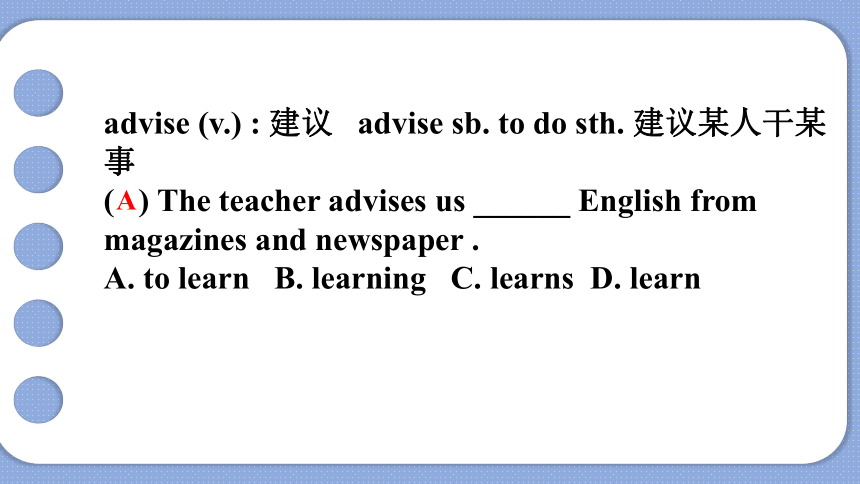
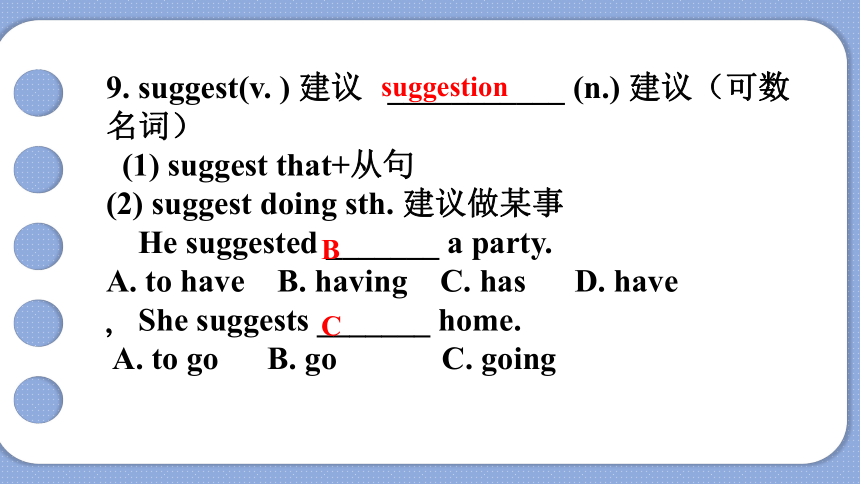
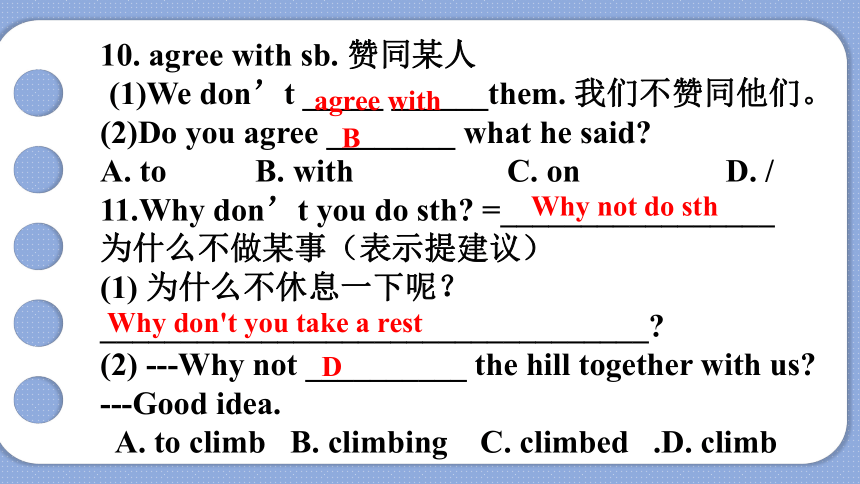

文档简介
(共91张PPT)
Module
1-
Module
6
英
期
语
中
堂
习
课
复
M
1
重点知识点
重点短语:
1.
说英语_____________________
2.
在课堂上____________________
3.
尽可能……地_______________
4.
查,查找
__________________
5.
听广播_____________________
6.
犯错误____________________
7.
写下,记下_________________
8.
同意某人(观点)____________
make
a
mistake
write
down
agree
with
speak
English
in
class
as
much
as
possible
look
up
listen
to
radio
9.
征求建议
10.
寻求帮助
ask
(sb.)
for
sth.
(向某人)征求……;寻求……
知识点:
1.尽可能多地
as
adv.
as
possible
=
as
adv.
as
sb.
can
尽可能地
During
the
race,
I
run
as
fast
as
possible
/
I
can.
在赛跑时,我尽可能快地跑。
ask
for
advice
ask
for
help
as
much
as
possible
2.practise
(v.)
练习
练习做某事______________________________
(1)The
children
often
practise
_________
basketball
on
the
playground.
A.
to
play
B.
play
C.
playing
(2)
我们应该经常练习说英语。We
should
often
practise
_________(speak)English.
2.
look
up
查阅,抬头向上看
look
out
当心
look
after
照顾
look
for
寻找
look
forward
to
期盼,期待
practise
doing
sth
C
speaking
3.possible
可能的,反义词impossible
as.....as
possible
尽可能地
Nothing
is
_____________
(possible),if
you
put
your
heart
in
it.
4.
make
a
mistake/make
mistakes
犯错,出错
The
little
boy
often
__________________________
in
his
homework.
这个小男孩经常在作业中犯错。
impossible
make
a
mistake
5.
write
down
写下…(代词做宾语,放在中间)
把它/它们写下来。
__________________________________
6.
forget
to
do
sth.
忘记要做某事
(事情还没做)
forget
doing
sth.
忘记做过某事(事情已做了)
(1)
---Don’t
forget
_______
your
homework,
John.
---OK.
I’ll
do
it
right
now.
A.
doing
B.
do
C.
to
do
(2)
I
forgot
_________
(borrow)
some
money
from
you
last
week,
I’m
so
sorry.
Write
it/
them
down
C
borrowing
8.
advice(n.)
建议
(不可数名词)
suggestion
建议
(可数名词)
(1)
一些建议:________________
一条建议:____________________
(2)
I
don’t
know
how
to
keep
healthy,
can
you
give
me
___________?
A.
an
advice
B.
lots
of
advices
C.
a
few
advices
D.
some
advice
some
advice
a
piece
of
advice
D
advise
(v.)
:
建议
advise
sb.
to
do
sth.
建议某人干某事
(
)
The
teacher
advises
us
______
English
from
magazines
and
newspaper
.
A.
to
learn
B.
learning
C.
learns
D.
learn
A
9.
suggest(v.
)
建议
___________
(n.)
建议(可数名词)
(1)
suggest
that+从句
(2)
suggest
doing
sth.
建议做某事
?He
suggested
_______
a
party.
A.
to
have
B.
having
C.
has
D.
have
?She
suggests
_______
home.
A.
to
go
B.
go
C.
going
C
B
suggestion
10.
agree
with
sb.
赞同某人
(1)We
don’t
_____
______them.
我们不赞同他们。
(2)Do
you
agree
________
what
he
said?
A.
to
B.
with
C.
on
D.
/
11.Why
don’t
you
do
sth?
=_________________
为什么不做某事(表示提建议)
(1)
为什么不休息一下呢?__________________________________?
(2)
---Why
not
__________
the
hill
together
with
us?
---Good
idea.
A.
to
climb
B.
climbing
C.
climbed
.D.
climb
agree
with
B
Why
not
do
sth
Why
don't
you
take
a
rest
D
表示提建议的句型有:
How/What
about
…
?
Let’s
…
Why
don’t
you…?
Why
not…?
You
should/shouldn't
…
It's
a
good
idea
to
do.....
doing
sth.
do
sth.
常用的回答是:
That’s
a
good/great
idea.
OK./
All
right.
13.
It’s
a
good
idea
to
do
sth.
=______________________
做某事是个好主意。
It’s
+名词(短语)+to
do
sth.
做某事是……
It’s
+形容词
for
sb
to
do
sth
做某事对某人怎么样
晚饭后散步是一个好习惯。__________________________
take
a
walk
after
supper.
It's
a
good
habit
to
to
do
sth
is
a
good
idea
14.
be
good
for
对……有利/益/好处
Doing
eye
exercises
_____
______
_____
our
eyes.
做眼保健操对眼睛有利
擅长……
_______
He___________________
basketball.他擅长打篮球。
15.
be
afraid
to
do
sth.=be
afraid
of
doing
sth
害怕做某事
I_______________________________
at
night.
=
I
_________________________________
at
night我害怕夜晚出去
is
good
for
be
good
at
is
good
at
playing
am
afraid
to
go
out
am
afraid
of
going
out
16.
stop
to
do
sth.
停下来去做另一件事
stop
doing
sth.
停止做正在做的事情
(1)
Stop
_______,
the
baby
is
sleeping.
A.
talk
B.
to
talk
C.
talking
(2)
We
are
very
tired,
so
we
stop
_______
a
rest.
A.
have
B.
to
have
C.
having
C
B
17.
try
to
do
sth.
________________
否定句:________________________
Try
to
listen
to
the
teacher
carefully
in
class.
try
doing
sth.
_________________
(1)
The
Americans
tried
using
chopsticks.
(2)
If
you
want
to
improve
your
speaking,
_______
English
as
much
as
possible.
A.
try
to
speak
B.
try
not
say
C.
try
to
say
D.
try
not
to
speak
努力做某事
尝试做某事
A
try
not
to
do
sth
中考链接
—
How
about
going
camping
in
the
mountain?
—
_____________
.
A.
Me,
too
B.
Good
idea
C.
It
doesn’t
matter
D.
Help
yourself
2.
When
you
don’t
know
a
word,
you
can
_____
in
the
dictionary.
A.
look
it
up
B.
set
it
up
C.
give
it
up
D.
pick
it
up
3.—Why
couldn't
you______
the
correct
spelling
of
the
word?
—Err.
.
.
I
hadn't
got
a
Chinese-English
dictionary
at
hand.
A.
look
for
B.
look
down
C.
look
up
D.
look
at
4.
—
Why
not
get
your
husband
a
CD
player
for
his
birthday?
—
________.
That’s
too
expensive.
A.
Good
idea!
B.
I
agree
with
you.
C.
No
way!
D.
Not
at
all.
5.
—
Where
is
Grace?
—
She
_____
in
the
yard.
A.
reads
B.
read
C.
is
reading
D.
was
reading
6.
I
often________
my
homework
after
supper.
But
yesterday
evening,
I________
TV.
A.
do;
watch
B.
did;
watched
C.
did;
watch
D.
do;
watched
7.
Remember
_______
your
personal
information
to
strangers.
It's
dangerous.
A.
to
tell
B.
not
to
tell
C.
not
tell
8.
—
It's
going
to
rain.
Remember
_____
an
umbrella
when
you
go
to
school.
—
All
right,
Mom.
A.taking
B.bringing
C.to
take
D.to
bring
M
2
重点知识点
I.
重点短语:
1.相当好
__________________
2.
on
the
coast
____________________
3.实际上
______________________
4.
in
the
1980s
____________________
5.
one
day
_____________________
6.与….一样…
_____________________
7.the
population
of_______________
8.
记得做某事_____________
pretty
good
在...海岸上
in
fact
在二十世纪八十年代
某一天
as...as...
...的人口
remember
to
do
sth
9.be
famous
for
___________________
10.
in
the
eastof_________________________
11.
on
the
coast
of
___________________
12.such
as____________________________
因...而出名
在...的东部
在...的海岸上
例如
Module
2
1.
in
the
1980s
20世纪80年代
in
the
19th
century
在19世纪
(用in
the
+序数词+
century)
⑴我爷爷出生在19世纪50年代
My
grandpa
was
born
__
___
___.
⑵A
war
took
place
in
_________
A.
the
1970s
B.
1970s
C.
the
1970s’
in
the
1950s
A
2.
get的用法
get有达到、得到、抵达的意思,相关短语有:
get
up
起床
get
on上车
get
off下车
get
to到达
get
ready
for为……做准备
get
on
well
with与……融洽相处
3.
as
busy
as…与…一样繁忙
肯定形式:as
+形容词/副词的原级+as…
与…一样
否定形式:not
as/
so
…as…与…不一样,不如
⑴我妹妹和我一样高
My
sister
is
__
___
__
me.
⑵
Tom唱歌不如Lucy
好。Tom
doesn't
sing
___
____
__Lucy.
⑶
Li
Hua's
shoes
aren't
as
______
as
Zhang
Hui's.
A.
cheap
B.
cheaper
C.
the
cheaper
as
tall
as
as
as
A
well
4.
⑴What’s
the
population
of+地点
=
How
large
is
the
population
of
+地点
=How
many
people
are
there
in+地点
某地有多少人口
①中国的人口是多少?
________
_______
______
________
_______China?
______
______
_______
_______
_______
_____China?
_______
______
______
_______
_____
_______China?
What
is
the
population
of
How
large
is
the
population
of
How
many
people
are
there
in
What
is
the
population
of
of
there
of
population
of
②中国有13亿多的人口。
There
are
over
1.3
billion
people
in
China.
China
is
over
1.3
billion.
⑵
The
population
of
…①集体名词作主语,谓语动词用单数。
②前有百分数,分数修饰时,谓语动词用复数。
A.
The
population
of
China
large.
B.
About
seventy
percent
(70%)
of
the
population
of
China_____
farmers.
中国大约有百分之七十的人口是农民。
is
are
⑶表示人口多用large或great,表示人口少用small。
The
population
of
Japan
is
______
than
China.
A.
small
B.
smaller
C.
little
D.
less
B
5.
hundred(百),thousand(千),million(百万),billion(十亿)
(1)
hundreds
of,
thousands
of,
millions
of,
billions
of
表示约数,意为“成百成千的”,
“成千成万的”,“上百万的”,“数十亿的”。
(2)
3.5
million
_____________
7
million
________________
5000________________
12500000
__________________
3500000
700000
5
thousand
1.25
million
6.
remember
to
do
sth
(未做)=
Don’t
forget
to
do
sth
记得要做某事
remember
doing
sth
记得曾做过某事(已做了)
①
Remember
_______
the
door
when
you
leave.
②
I
remember
_______
the
door
when
I
left.
A.
to
close
B.
close
C.
closing
(3)
在操场上有三百名学生。
There
on
the
playground.
(4)
在日本地震中成千上万的人失去了家园。
people
lost
their
homes
in
Japan’s
earthquake.
are
three
hundred
students
Thousands
of
to
close
C
7.
in
the
east
of
在…的东部
表示方位的介词有:in,on,
to
in表示在范围以内;on表示两地连接;to表示两地相隔用to。
⑴
Hainan
is
________
the
south
of
China.
⑵
Hubei
is
________the
north
of
Hunan.
⑶
Japan
is
__________the
east
of
China.
in
on
to
8.
be
famous
for
be
famous
as+职业
(1)
北京以许多名胜古迹而出名。
Beijing
___
_____
___
many
places
of
interest.
(2)
Liuhuan
___
_______
__
a
singer.
is
famous
for
is
famous
as
9.
on
the
coast
在海岸线上
10.
bigger
and
bigger
比较级+比较级
越来越…
天气变得越来越冷。The
weather
is
getting
______
_______
_______.
11.
修饰比较级,表示程度的词:much,
a
lot
,
a
little,
a
bit,
far,
even
等
(1)
我比我哥哥高一点。I’m
_____
_______taller
than
my
brother.
(2)
It’s
_______
hotter
than
yesterday.
A.
much
B.
quite
C.
very
colder
and
colder
a
little
A
12.such
as
例如
such
as
常列举同类人或物中的
例子,后面不用逗号隔开。
for
example
一般只举同类人或物中的
例子,用逗号隔开,可置句首、句中、句末。
(1)
中国有许多大城市,比如北京、上海、深圳等等。
China
has
many
big
cities,
Beijing,
Shanghai,
Shenzhen
and
so
on.
(2)
举例说明,噪音就是一种污染。
Noise
,
,
is
a
kind
of
pollution.
几个
一个
such
as
for
example
1.
You
should
not
speak
_______
(大声地)in
the
reading
room
.
2.
I’d
like
______
(visit)the
Diwang
Tower
this
summer
.
3.
The
______
(busy)he
is
,the
______
(happy)he
feels
.
4.
The
weather
is
______
(hot)in
Hainan
than
that
is
Beijing
.
5.
Tom
does
his
homework
________
.Sam
does
his
homework
_______
than
Tom
does
.(well)
用所给的词
的适当形式填空
loudly
to
visit
busier
happier
hotter
well
better
6.
Dongying
is
becoming
_______
and
________
.(clean)
7.
The
streets
are
much
______
(宽的)now
than
before
.
8.
The
price
of
this
shirt
is
very
______
(低的).I’ll
buy
it
.
9.
It's
going
to
rain.
Don't
forget
to
bring
an
_________
(伞).
10.
There
are
some
beautiful
________
(岛)in
the
north
of
the
city
.
cleaner
cleaner
wider
low
umbrella
islands
M
3
重点知识点
重点短语:
1、观看比赛____________________
2、在电视上______________________
3、一个人都不……__________________
4.
更令人兴奋__________________
5.
打网球____________________
6.
呆在家里____________________
7.
没关系____________________
8.
大量;众多___________________
watch
the
match
on
TV
no
one...at
all
more
exciting
play
tennis
stay
at
home
never
mind
plenty
of
9.
热身;做准备活动_________________
10.
迟到______________
11.
球迷俱乐部________________
12.为…加油____________
cheer
on
fan
club
be
late
for
warm
up
Module
3
1.
exciting
令人激动的
(物作主语)
excited
兴奋的,激动的
(人作主语)
be
excited
about
sth
对…感到兴奋
be
excited
to
do
sth
对做某事感到兴奋
⑴He
is
_________
about
the
_________
news.
A.
exciting,
excited
B.
excited,
exciting
C.
exciting,
exciting
⑵
He
_______
_________
_________
go
to
the
university.
他对去上大学感到兴奋。
B
is
exciting
to
以ing
结尾的形容词
以-ed结尾的形容词
boring无聊的
bored感到无聊的
exciting令人兴奋的
excited感到兴奋的
interesting有趣的
interested感兴趣的
tiring令人疲惫的
tired感到疲惫的
relaxing令人放松的
relaxed感到放松的
surprising令人惊讶的
surprised感到惊讶的
2.
What’s
the
matter
with
sb/sth…?=What’s
wrong
with
sb/sth…?
……怎么了?
⑴______
____
_______
____you?
你怎么了?
(2)
---
?You
looked
so
tired.
---I
played
football
with
my
friends
just
now.
A
What's
your
favourite
sport
B.
How
do
you
feel
C
What's
the
matter
D.
Why
do
you
like
it
What's
the
matter
with
C
3.
miss
未击中,未达到,错过,想念
miss
the
ball
错过球,(没看到比赛)
⑴
Tony
_________
the
basketball.
Tony没有抓到篮球。
⑵
We
__________
the
early
bus
yesterday
morning.
昨天早上我们没有赶上早班公共汽车。
⑶
I
_________
my
old
classmates
very
much.
我非常想念我的老同学
(4)
If
you
don't
get
to
the
railway
station
early,
you
may
the
train.
A.
catch
B.
miss
C.
lose
D.
give
missed
missed
miss
B
4.
never
mind
没关系,
不要紧
mind
doing
sth.
当别人向你道歉时
--I
am
sorry
to
trouble
you.--Never
mind.
请别人放心或安慰别人时
--I
am
very
nervous.--Never
mind.
You
can
do
it.
(1)
---Oh,
I
missed
the
film.
---
.The
film
will
be
on
TV
next
month.
A.
No
idea
B
.What
happened?
C.
Never
mind
D.
Bad
luck
C
5.
play
against
对…
与…比赛
(1)
Which
team
do
they_______
________this
time.
这次他们的对手是谁?
(2)
I
am
in
our
school
team
and
we
are
going
to
play
______another
school
next
week.
A
.for
B
.with
C.
against
D.
except
play
against
C
6.
so
that+从句=in
order
to
do
sth
以便,为了(so
that引导结果状语从句)
I
get
up
early_______
_______
I
can
catch
the
early
bus.
=
I
get
up
early______
______
______catch
the
early
bus.
我很早起床以便能赶上早班公共汽车。
so
that
in
order
to
7.
beat
打败,战胜(后面跟人/队/组
);win
获胜,赢得(后面跟比赛/奖品)
(1)My
sister
is
good
at
playing
table
tennis
and
she
always
__________me.
(2)They
hope
to
________the
basketball
match
beat
win
9.
be
pleased
with
对…满意
be
pleased
to
do
sth
乐意/高兴
做某事
(1)
My
mother
____
______
___me.
我妈妈对我很满意。
(2)
I
___
______
____
meet
you.
我很高兴见到你。
10.
careless
粗心的
careful
小心的,仔细的
carelessly
粗心地
carefully
小心地
is
pleaed
with
am
pleased
to
练习:单项选择
(
)
1.
---What’s
the
matter
___
you?
---I
catch
a
cold.
A.
for
B.
with
C.
to
D.
at
(
)
2.
The
comic
book
is
very
______.I’d
like
to
watch
it
again.
A.
bored
B.
boring
C.
excited
D.
exciting
(
)
3.
She
plays
chess
better
than
me.She
always
_______
me.
A.
wins
B.
beats
C.
gets
D.
loses
(
)
4.
---Do
you
mind
_____
your
bike
there?
---Not
at
all.
A.
move
B.
moving
C.
to
move
D.
moves
B
D
B
B
(
)
5.
I
wouldn’t
mind_______
a
roommate.
We
can
help
each
other
and
save
money
as
well.
A.
having
B.
to
have
C.
have
D.
had
(
)
6.
Taking
the
train
is
____
and
safer
than
taking
the
plane.
A.
cheap
B.
cheaper
C.
popular
D.
difficult
(
)
7.
Which
pen
is
______,this
one
or
that
one?
A.
long
B.
longer
C.
longest
D.
the
longest
(
)
8.
---
Do
you
like
playing
table
tennis
or
swimming?
---
Table
tennis.
I
think
it
is
than
swimming.
A.
exciting
B.
more
boring
C.
more
exciting
D.
boring
A
B
B
C
(
)
9.
They
are
good
at
playing
_______
tennis,but
they
can’t
play
_______
piano
very
well.
A.
the;the
B./;/
C.
the;/
D./;the
(
)
10.
---
Dick,
do
you
often
play
violin
in
your
free
time?
---
No.
I
often
play
volleyball
with
my
friends.
A.
the;
/
B.
a;
the
C.
/;
the
D.
the;
a
D
A
M
4
重点知识点
重点短语:
1.
远离_______________________
2.乘坐公交车_________________
3.乘坐地铁___________________
4.
一直,不断地__________________
5.
计划做某事
______________
6.
待在城外
___________________
7.
as…as
_______
8.
because
of
____________
9.
变得拥挤__________________
far
away
by
bus/
take
a
bus
by
underground/
take
the
underground
all
the
time
plan
to
do
sth
stay
outside
the
city
centre
和...一样
因为
get
crowed
1.
choice
n.选择
---The
last
bus
has
left.
What
should
we
do?
---Let's
take
a
taxi.
We
have
no
other
now.
A.
choice
B.
reason
C.
habit
A
2.
关于how的特殊疑问句
(1)How
does
Tony
go
to
school?
(2)关于交通方式的回答
by
+交通工具&take+a/
the+交通工具
by
taxi
=
take
a
_______坐出租车
______________=________________
乘公共汽车
______________=________________坐地铁
______________=________________
乘飞机
______________=________________
骑自行车
______________=________________
乘火车
I
often
go
to
work__________
_________
=
I
often
_____
______
_______
to
work.我经
taxi
by
bus
take
a
bus
by
underground
take
the
underground
by
plane
take
a
plane
by
bike
ride
a
bike
by
train
take
a
train
by
bus
take
a
bus
3.
be
far
from……
离……远
(1)His
home
_______
_________
______
school.他的家离学校很远。
(2)---
is
it
from
the
museum
to
the
cinema?
---About
twenty
minutes
walk.
A.
How
long
B.
How
far
C.
How
often
D.
How
much
is
far
from
B
4.
the
same
as:__________
反义短语______________
(1)
The
twins
look
_______
_______
______
each
other.这对双胞胎看上去长得一样。
(2)
For
me,
a
good
friend
likes
to
do
the
same
things
___
me.
A.
for
B.
from
C
.to
D.
as
和..一样
be
different
from
the
same
as
D
5.
plan
to
do
sth
_________________
制定计划_________________
(1)
He
doesn’t
_______
________
go
to
Beijing
on
vacation.
(2)
The
children
plan
their
school
yard
this
Friday
afternoon.
A.
clean
B.
to
clean
C.
cleaning
D.
clean
计划做某事
make
a
plan/
make
plans
plan
to
B
6.
how
long
多长时间
how
often
多久一次
how
soon
再过多久
(1)
---Sally,
I
heard
you're
going
to
America.
______
will
you
stay
there?
---Two
whole
years
(2)
---
do
you
visit
your
mother?
---Twice
a
week.
(3)
---
will
he
come
back?
---In
an
hour.
A.
How
soon
B.
How
often
C.
How
long
How
often
A
7.
except
除……以外
(前后事物是同类的)
(1)
He
answered
all
the
questions
the
last
one.
除了最后一题,他回答了所有的问题.
(2)
except
for
表示整个基本情况之后,对细节加以纠正。(前后事物是不同类的)
Your
composition
is
very
good
a
few
mistakes.
除了几处错误之外,你的作文非常好。
(3)
besides
除…之外还有
except
except
for
8.
It
takes/
took
sb
some
time
to
do
sth.
(it为形式主语,不能翻译为“它”。to
do
sth为真正的主语)
It
usually
takes
me
10
minutes
to
school
every
day.
A.
to
get
B
get
C
gets
D
getting
A
9.
the+比较级,
the+另一词的比较级(
越…….就越
…….)
⑴
The
_________
you
read,
the_________
you
are.
你读得越多,你就越聪明。
⑵
The
more
careful
you
are,
the
_______
mistakes
you
will
make.
A.
few
B.
fewer
C
.fewest
(3)
the
mountain
is,
the
air
is.
A.
The
highest;
the
thinnest
B
.Higher;
thinner
C
.The
higher;
the
thinner
more
clever
B
C
10.
because
+
状语从句
因为....(后面跟句子)
because
of+名词/代词/动名词(后面跟词或词组)
(1)He
didn’t
go
to
the
meeting
________
he
had
too
much
work
to
do.
(2)
He
didn’t
come
yesterday____________
his
illness.
(3)
The
old
man
had
to
be
in
hospital
poor
health
A.
so
B.
because
C.
because
of
D.
though
because
because
of
C
11.
get
crowded
“变得拥挤”
get
短语:
_____________迷路
_____________结婚
_____________穿衣
_____________受伤
get
losed
get
married
get
dressed
get
hurt
12.最舒服的
___________
_
(1)the
+单音节词+est
tall_____
______
strong
_______
______
old______
_____
large_____
______
fine_____
______
late_____
______
big
_____
______
hot
_____
______
thin______
_____
____
______
the
most
comfortable
the
tallest
the
strongest
the
oldest
the
largest
the
finest
the
latest
the
biggest
the
hottest
the
thinnest
(2)the
+双音节词+est
clever_____
______
busy_____
______
happy_____
______easy
_____
______
heavy_____
______
early_____
______
(3)the
+most
+多音节词
important
____
_____
_________
difficult
_____
______
___________
interesting
_____
______
__________
dangerous
_____
______
__________
delicious
_____
______
___________
expensive_____
______
___________
the
cleverest
the
busiest
the
happiest
the
easiest
the
heaviest
the
earliest
the
most
important
the
most
difficult
the
most
interesting
the
most
dangerous
the
most
delicious
the
most
expensive
1
The
beautiful
dress
______
(花费)me
so
much
.
2
This
is
one
of
the
most
difficult
______
(问题)that
I
have
ever
seen
.
3
Travelling
by
plane
is
_______
(expensive)than
by
train
.
4
I
live
far
from
our
school
.But
my
friend
Tony
lives
the
_______
(far)in
our
school.
5
The
___________
(comfortable)way
to
go
to
school
is
taking
a
train
.
costs
quetions
more
expensive
farthest
most
comfortable
6
Jim
has
________
(much)free
time
of
us
four
.
7
who
is
the
______
(three)student
to
get
to
school
on
time
this
morning
?
8
_______
(million)of
Americans
travel
by
underground
every
year
.
9
Yang
Mi
is
a
famous
_______
(女演员)now
.
10
I
was
born
in
a
_______
(普通的)family
.
11
I
like
to
watch
the
international
________
(魔术的)performance
.
more
third
Millions
atresses
common
magic
12
The
girl
had
no
______
(主意)about
Beijing
Opera
.
13
The
manager
told
the
shop
assistant
to
be
polite
to
the
________
(顾客).
14
Mellisa
looked
_______
(worry)because
she
lost
her
money
.
15
Your
task
is
______
(find)the
cost
of
the
hostel.
idea
customers
worried
to
find
I.
重点短语。
1.
in
the
end
____________
2.
no
idea
___________
3.
京剧
____________________
4.
同意做某事
____________________
5.
想要做某事
_________________
6.
主动提出做某事
________________
7.
计划做某事
___________________
8.
希望做某事
最后,终于
不知道
Beijing
Opera
agree
to
do
sth
want
to
do
sth
offer
to
do
sth
plan
to
do
sth
hope
to
do
sth
I.
重点短语。
1.
校长
______________
2.
……之一
_________
3.
最著名
_____________
4.
普通人的生活
__________________
5.
第十九世纪
______________
6.
出生
_____________
8.
二十世纪中期
___________________
7.
返回,归来
_______________
9.
魔术表演
___________________
10.
热烈欢迎
____________________
11.
发生
___________________;
the
lives
of
common
people
the
nineteenth
century
be
born
the
middle
of
the
twentieth
century
return
to
magic
show
give
warm
welcome
to
head
teacher
one
of
the
most
famous
take
place
看下面的句子:
①
Mr.
Brown
decided
to
stay
for
a
cup
of
coffee.
布朗先生决定留下来喝杯咖啡。
②
Lily
tried
her
best
to
understand
the
Chinese
words.
莉莉尽力去理解这些中文词汇。
③
They
want
to
go
to
the
teahouse.
他们想去茶馆。
④
Betty’s
parents
offered
to
take
her
to
the
Great
Wall.
贝蒂的父母提出带她去长城。
⑤
I
hope
to
travel
around
the
world
next
year.
我希望明年环游世界。
⑥
Lilei
loves
to
play
basketball.
李雷喜欢打篮球。
→自主归纳:分析上面6个句子,我们可以发现:动词不定式的基本构成形式是____________,位置都是在____________之后,作动词的____________,表明意图、希望或者决定的内容。
to
do
谓语动词
宾语
II.
offer后面接动词的时候,要使用动词的什么形式?
观察下面的句子:①
The
headmaster
offered
to
show
us
around.
校长主动带我们到处看看。
②
My
parents
offered
to
take
us
to
the
teahouse.
我的父母提议带我们去茶馆。
③
They
offered
Mary
a
very
good
job.
他们给玛丽提供了一份很好的工作。
→自主归纳:offer的意思是____________,常有“主动提出”的含义。其后直接跟动词的时候,要使用____________的形式。常使用的句型结构有:_______________,表示“主动做某事”;
offer
sb.
sth.或者_______________,表示“主动为某人提供某物”。
提供
offer
to
do
offer
sth
to
sb
to
do
①
My
brother
bought
me
some
storybooks.
我的哥哥给我买了一些故事书。
②
My
uncle
gave
me
a
very
nice
pen.
我的叔叔给了我一支非常漂亮的钢笔。
③
Can
you
pass
me
that
pencil?
你能递给我那支铅笔吗?
④
Who
teaches
you
English?
谁教你们英语?
⑤
Carol’s
mom
cooked
us
a
delicious
meal.
卡罗的妈妈给我们煮了一顿美味的大餐。
⑥
Jim
lent
Mike
his
favorite
bike.
吉姆借给了麦克他最喜欢的自行车。
→自我归纳:以上6个句子都采用了“动词+人+物”的表达方式,我们把这种结构称为____________。其中,句中的“人”称为____________,“物”称为____________。可以接双宾语的动词很多。在具体的表达中,我们可以将直接宾语提前,此时,间接宾语前要使用介词。
双宾语结构
间接宾语
直接宾语
在表达“给某人某物”的时候出现了两个动作的承受者,一是物,二是人。
give
sb.
sth.
=
give
sth.
to
sb.
bring
sb.
sth.
=
bring
sth.to
sb.
lend
sb.
sth.
=
lend
sth.
to
sb.
hand
sb.
sth.
=
hand
sth.
to
sb.
send
sb.sth.
=
send
sth.
to
sb.
show
sb.
sth.
=
show
sth.
to
sb.
leave
sb.
sth.
=
leave
sth.
to
sb.
teach
sb.
sth.
=
teach
sth.
to
sb.
buy
sb.
sth.
=
buy
sth.
for
sb.
cook
sb.
sth.
=
cook
sth.
for
sb.
read
sb.
sth.
=
read
sth.
for
sb.
例子:twenty
→
twentieth
→练一练:写出下列基数词的序数词形式。
ten
________
thirty
________
forty
________
fifty
________
sixty
________
seventy
________
eighty
________
ninety
________
tenth
thirtieth
fortieth
fiftieth
sixtieth
seventieth
eightieth
ninetieth
整十基数词变序数词
M
6
重点知识点
重点短语:
1.
在危险中______________
2.
at
last_____________
3.
get
close
to
___________
4.
对…感兴趣____________________
5.
查明,发现_______________
6.
拿走,带走_____________
7.
in
peace__________
8.
照顾_____________
9.think
of
_____________
10.
尽可能的_____________
in
danger
最后
接近
be
interested
in
find
out
take
away
和平的
look
after
想到
as...as
possible
13.
为了__________
14.
开办;设立;创办;建立__________
15.
自然公园__________
16.
例如;比如
__________________
17.
在野外____________________
18.
照顾___________________
19.
研究中心___________________
in
order
to
set
up
nature
park
for
example
in
the
wild
look
after
research
centre
1.
It’s
sad
to
think
of
the
pandas
and
other
animals
in
danger.
(1)
think
of
是固定搭配,
意为“想起,想到”。think
of
还有“以为”之意。如:
①
I
felt
excited
when
I_____
____
the
football
match.当我想起那场比赛的时候,觉得很兴奋。
②
What
do
you________
_______
the
talk
show?你觉得那个谈话节目怎么样?
thought
of
think
of
(2)
in
danger
表示“处于危险中”。其中danger
是名词。
danger
派生词
dangerous
(adj.)
危险的
短语
in
danger
处于危险中,
out
of
danger
脱离危险
反义词
safety
(n.)
安全
safe(adj.)
安全的——dangerous
危险的
Eg:
We
should
protect
the
wild
animals
which
are
in
_______(危险)。
danger
2.
But
I
am
more
interested
to
see
the
pandas
in
the
Wolong
Panda
Reserve.
短语:
be
interested
in
对……更感兴趣
E.g.
The
boy
_____
__________
______
the
film.这个小孩对这部电影感兴趣。
3.
because
it
allows
people
to
get
closer
to
them.
allow
sb.
to
do
sth.
允许某人做某事
e.g.
His
father
doesn’t______
him
______
play
before
finishing
his
homework.(allow)
is
interested
in
allow
to
4….
because
villages
and
farms
are
growing
bigger
and
are
taking
away
their
land
and
forest
为村庄和农场越来越大,侵占了它们的土地和森林。
take
away
表示“夺去,拿走”。
take
it
\
them
away
e.g.
There
are
too
many
books
on
the
desk
,
please
take
_______
away.
them
1.
Scientist
are
doing
a
lot
of
research
to
help
pandas
produce
more
babies
and
help
baby
pandas
live.
此句的主语是
“Scientists”,谓语是
“are
doing”,宾语是
“a
lot
of
research”,后面的动词不定式
“to
help
pandas…”表示目的,作目的状语。
Eg:
The
WWF
is
working
hard
____
_______
them
all.
世界自然基金会正在努力拯救他们。
to
save
2.
In
order
to
protect
pandas
in
the
wild,
the
government
is
setting
up
nature
parks
and
developing
other
plans.
为了保护野生大熊猫,政府正在建立自然公园和其他发展计划。
in
order
to
“目的是;为了……”,后跟动词原形。否定形式:in
order
not
to
do
sth.
(1)
_______
________
to
_______
a
doctor,
you
have
to
study
in
college
for
five
years.
要当一名医生,你需要在大学学习五年。
(2)
We
get
up
early
______
________
______
catch
the
early
bus.
我们早起是为了赶早班车。
In
order
be
in
order
to
3.
Each
panda
needs
to
eat
a
lot
of
bamboo
every
day.
every和each的区别
every
“每”“各”,指三者或三者以上的整体,含有全体之意。
e.g.
__________boy
is
here.
所有男孩都在这儿。
each
“每一”“每个”,指两个或两个以上的每一个,着重于个别,如团体中一个的人或物。
e.g.
He
spoke
to
__________
member
of
the
team.
他和队里的每个队员都说了话。
Every
each
4.
In
order
to
protect
pandas
in
the
wild,
the
government
is
setting
up
nature
parks
…
set
up
创建,创办
e.g.
He
wants
to
___
___a
school
for
the
poor
children.
他想为贫困地区的孩子创办一所学校。
5.
And
it
chose
the
panda
to
be
its
symbol.
be
the
symbol
of
表示“是……的象征”。
e.g.
Green
___
____
________
____
Spring.
绿色是春天的象征。
set
up
is
the
simbol
of
Thank
you
Module
1-
Module
6
英
期
语
中
堂
习
课
复
M
1
重点知识点
重点短语:
1.
说英语_____________________
2.
在课堂上____________________
3.
尽可能……地_______________
4.
查,查找
__________________
5.
听广播_____________________
6.
犯错误____________________
7.
写下,记下_________________
8.
同意某人(观点)____________
make
a
mistake
write
down
agree
with
speak
English
in
class
as
much
as
possible
look
up
listen
to
radio
9.
征求建议
10.
寻求帮助
ask
(sb.)
for
sth.
(向某人)征求……;寻求……
知识点:
1.尽可能多地
as
adv.
as
possible
=
as
adv.
as
sb.
can
尽可能地
During
the
race,
I
run
as
fast
as
possible
/
I
can.
在赛跑时,我尽可能快地跑。
ask
for
advice
ask
for
help
as
much
as
possible
2.practise
(v.)
练习
练习做某事______________________________
(1)The
children
often
practise
_________
basketball
on
the
playground.
A.
to
play
B.
play
C.
playing
(2)
我们应该经常练习说英语。We
should
often
practise
_________(speak)English.
2.
look
up
查阅,抬头向上看
look
out
当心
look
after
照顾
look
for
寻找
look
forward
to
期盼,期待
practise
doing
sth
C
speaking
3.possible
可能的,反义词impossible
as.....as
possible
尽可能地
Nothing
is
_____________
(possible),if
you
put
your
heart
in
it.
4.
make
a
mistake/make
mistakes
犯错,出错
The
little
boy
often
__________________________
in
his
homework.
这个小男孩经常在作业中犯错。
impossible
make
a
mistake
5.
write
down
写下…(代词做宾语,放在中间)
把它/它们写下来。
__________________________________
6.
forget
to
do
sth.
忘记要做某事
(事情还没做)
forget
doing
sth.
忘记做过某事(事情已做了)
(1)
---Don’t
forget
_______
your
homework,
John.
---OK.
I’ll
do
it
right
now.
A.
doing
B.
do
C.
to
do
(2)
I
forgot
_________
(borrow)
some
money
from
you
last
week,
I’m
so
sorry.
Write
it/
them
down
C
borrowing
8.
advice(n.)
建议
(不可数名词)
suggestion
建议
(可数名词)
(1)
一些建议:________________
一条建议:____________________
(2)
I
don’t
know
how
to
keep
healthy,
can
you
give
me
___________?
A.
an
advice
B.
lots
of
advices
C.
a
few
advices
D.
some
advice
some
advice
a
piece
of
advice
D
advise
(v.)
:
建议
advise
sb.
to
do
sth.
建议某人干某事
(
)
The
teacher
advises
us
______
English
from
magazines
and
newspaper
.
A.
to
learn
B.
learning
C.
learns
D.
learn
A
9.
suggest(v.
)
建议
___________
(n.)
建议(可数名词)
(1)
suggest
that+从句
(2)
suggest
doing
sth.
建议做某事
?He
suggested
_______
a
party.
A.
to
have
B.
having
C.
has
D.
have
?She
suggests
_______
home.
A.
to
go
B.
go
C.
going
C
B
suggestion
10.
agree
with
sb.
赞同某人
(1)We
don’t
_____
______them.
我们不赞同他们。
(2)Do
you
agree
________
what
he
said?
A.
to
B.
with
C.
on
D.
/
11.Why
don’t
you
do
sth?
=_________________
为什么不做某事(表示提建议)
(1)
为什么不休息一下呢?__________________________________?
(2)
---Why
not
__________
the
hill
together
with
us?
---Good
idea.
A.
to
climb
B.
climbing
C.
climbed
.D.
climb
agree
with
B
Why
not
do
sth
Why
don't
you
take
a
rest
D
表示提建议的句型有:
How/What
about
…
?
Let’s
…
Why
don’t
you…?
Why
not…?
You
should/shouldn't
…
It's
a
good
idea
to
do.....
doing
sth.
do
sth.
常用的回答是:
That’s
a
good/great
idea.
OK./
All
right.
13.
It’s
a
good
idea
to
do
sth.
=______________________
做某事是个好主意。
It’s
+名词(短语)+to
do
sth.
做某事是……
It’s
+形容词
for
sb
to
do
sth
做某事对某人怎么样
晚饭后散步是一个好习惯。__________________________
take
a
walk
after
supper.
It's
a
good
habit
to
to
do
sth
is
a
good
idea
14.
be
good
for
对……有利/益/好处
Doing
eye
exercises
_____
______
_____
our
eyes.
做眼保健操对眼睛有利
擅长……
_______
He___________________
basketball.他擅长打篮球。
15.
be
afraid
to
do
sth.=be
afraid
of
doing
sth
害怕做某事
I_______________________________
at
night.
=
I
_________________________________
at
night我害怕夜晚出去
is
good
for
be
good
at
is
good
at
playing
am
afraid
to
go
out
am
afraid
of
going
out
16.
stop
to
do
sth.
停下来去做另一件事
stop
doing
sth.
停止做正在做的事情
(1)
Stop
_______,
the
baby
is
sleeping.
A.
talk
B.
to
talk
C.
talking
(2)
We
are
very
tired,
so
we
stop
_______
a
rest.
A.
have
B.
to
have
C.
having
C
B
17.
try
to
do
sth.
________________
否定句:________________________
Try
to
listen
to
the
teacher
carefully
in
class.
try
doing
sth.
_________________
(1)
The
Americans
tried
using
chopsticks.
(2)
If
you
want
to
improve
your
speaking,
_______
English
as
much
as
possible.
A.
try
to
speak
B.
try
not
say
C.
try
to
say
D.
try
not
to
speak
努力做某事
尝试做某事
A
try
not
to
do
sth
中考链接
—
How
about
going
camping
in
the
mountain?
—
_____________
.
A.
Me,
too
B.
Good
idea
C.
It
doesn’t
matter
D.
Help
yourself
2.
When
you
don’t
know
a
word,
you
can
_____
in
the
dictionary.
A.
look
it
up
B.
set
it
up
C.
give
it
up
D.
pick
it
up
3.—Why
couldn't
you______
the
correct
spelling
of
the
word?
—Err.
.
.
I
hadn't
got
a
Chinese-English
dictionary
at
hand.
A.
look
for
B.
look
down
C.
look
up
D.
look
at
4.
—
Why
not
get
your
husband
a
CD
player
for
his
birthday?
—
________.
That’s
too
expensive.
A.
Good
idea!
B.
I
agree
with
you.
C.
No
way!
D.
Not
at
all.
5.
—
Where
is
Grace?
—
She
_____
in
the
yard.
A.
reads
B.
read
C.
is
reading
D.
was
reading
6.
I
often________
my
homework
after
supper.
But
yesterday
evening,
I________
TV.
A.
do;
watch
B.
did;
watched
C.
did;
watch
D.
do;
watched
7.
Remember
_______
your
personal
information
to
strangers.
It's
dangerous.
A.
to
tell
B.
not
to
tell
C.
not
tell
8.
—
It's
going
to
rain.
Remember
_____
an
umbrella
when
you
go
to
school.
—
All
right,
Mom.
A.taking
B.bringing
C.to
take
D.to
bring
M
2
重点知识点
I.
重点短语:
1.相当好
__________________
2.
on
the
coast
____________________
3.实际上
______________________
4.
in
the
1980s
____________________
5.
one
day
_____________________
6.与….一样…
_____________________
7.the
population
of_______________
8.
记得做某事_____________
pretty
good
在...海岸上
in
fact
在二十世纪八十年代
某一天
as...as...
...的人口
remember
to
do
sth
9.be
famous
for
___________________
10.
in
the
eastof_________________________
11.
on
the
coast
of
___________________
12.such
as____________________________
因...而出名
在...的东部
在...的海岸上
例如
Module
2
1.
in
the
1980s
20世纪80年代
in
the
19th
century
在19世纪
(用in
the
+序数词+
century)
⑴我爷爷出生在19世纪50年代
My
grandpa
was
born
__
___
___.
⑵A
war
took
place
in
_________
A.
the
1970s
B.
1970s
C.
the
1970s’
in
the
1950s
A
2.
get的用法
get有达到、得到、抵达的意思,相关短语有:
get
up
起床
get
on上车
get
off下车
get
to到达
get
ready
for为……做准备
get
on
well
with与……融洽相处
3.
as
busy
as…与…一样繁忙
肯定形式:as
+形容词/副词的原级+as…
与…一样
否定形式:not
as/
so
…as…与…不一样,不如
⑴我妹妹和我一样高
My
sister
is
__
___
__
me.
⑵
Tom唱歌不如Lucy
好。Tom
doesn't
sing
___
____
__Lucy.
⑶
Li
Hua's
shoes
aren't
as
______
as
Zhang
Hui's.
A.
cheap
B.
cheaper
C.
the
cheaper
as
tall
as
as
as
A
well
4.
⑴What’s
the
population
of+地点
=
How
large
is
the
population
of
+地点
=How
many
people
are
there
in+地点
某地有多少人口
①中国的人口是多少?
________
_______
______
________
_______China?
______
______
_______
_______
_______
_____China?
_______
______
______
_______
_____
_______China?
What
is
the
population
of
How
large
is
the
population
of
How
many
people
are
there
in
What
is
the
population
of
of
there
of
population
of
②中国有13亿多的人口。
There
are
over
1.3
billion
people
in
China.
China
is
over
1.3
billion.
⑵
The
population
of
…①集体名词作主语,谓语动词用单数。
②前有百分数,分数修饰时,谓语动词用复数。
A.
The
population
of
China
large.
B.
About
seventy
percent
(70%)
of
the
population
of
China_____
farmers.
中国大约有百分之七十的人口是农民。
is
are
⑶表示人口多用large或great,表示人口少用small。
The
population
of
Japan
is
______
than
China.
A.
small
B.
smaller
C.
little
D.
less
B
5.
hundred(百),thousand(千),million(百万),billion(十亿)
(1)
hundreds
of,
thousands
of,
millions
of,
billions
of
表示约数,意为“成百成千的”,
“成千成万的”,“上百万的”,“数十亿的”。
(2)
3.5
million
_____________
7
million
________________
5000________________
12500000
__________________
3500000
700000
5
thousand
1.25
million
6.
remember
to
do
sth
(未做)=
Don’t
forget
to
do
sth
记得要做某事
remember
doing
sth
记得曾做过某事(已做了)
①
Remember
_______
the
door
when
you
leave.
②
I
remember
_______
the
door
when
I
left.
A.
to
close
B.
close
C.
closing
(3)
在操场上有三百名学生。
There
on
the
playground.
(4)
在日本地震中成千上万的人失去了家园。
people
lost
their
homes
in
Japan’s
earthquake.
are
three
hundred
students
Thousands
of
to
close
C
7.
in
the
east
of
在…的东部
表示方位的介词有:in,on,
to
in表示在范围以内;on表示两地连接;to表示两地相隔用to。
⑴
Hainan
is
________
the
south
of
China.
⑵
Hubei
is
________the
north
of
Hunan.
⑶
Japan
is
__________the
east
of
China.
in
on
to
8.
be
famous
for
be
famous
as+职业
(1)
北京以许多名胜古迹而出名。
Beijing
___
_____
___
many
places
of
interest.
(2)
Liuhuan
___
_______
__
a
singer.
is
famous
for
is
famous
as
9.
on
the
coast
在海岸线上
10.
bigger
and
bigger
比较级+比较级
越来越…
天气变得越来越冷。The
weather
is
getting
______
_______
_______.
11.
修饰比较级,表示程度的词:much,
a
lot
,
a
little,
a
bit,
far,
even
等
(1)
我比我哥哥高一点。I’m
_____
_______taller
than
my
brother.
(2)
It’s
_______
hotter
than
yesterday.
A.
much
B.
quite
C.
very
colder
and
colder
a
little
A
12.such
as
例如
such
as
常列举同类人或物中的
例子,后面不用逗号隔开。
for
example
一般只举同类人或物中的
例子,用逗号隔开,可置句首、句中、句末。
(1)
中国有许多大城市,比如北京、上海、深圳等等。
China
has
many
big
cities,
Beijing,
Shanghai,
Shenzhen
and
so
on.
(2)
举例说明,噪音就是一种污染。
Noise
,
,
is
a
kind
of
pollution.
几个
一个
such
as
for
example
1.
You
should
not
speak
_______
(大声地)in
the
reading
room
.
2.
I’d
like
______
(visit)the
Diwang
Tower
this
summer
.
3.
The
______
(busy)he
is
,the
______
(happy)he
feels
.
4.
The
weather
is
______
(hot)in
Hainan
than
that
is
Beijing
.
5.
Tom
does
his
homework
________
.Sam
does
his
homework
_______
than
Tom
does
.(well)
用所给的词
的适当形式填空
loudly
to
visit
busier
happier
hotter
well
better
6.
Dongying
is
becoming
_______
and
________
.(clean)
7.
The
streets
are
much
______
(宽的)now
than
before
.
8.
The
price
of
this
shirt
is
very
______
(低的).I’ll
buy
it
.
9.
It's
going
to
rain.
Don't
forget
to
bring
an
_________
(伞).
10.
There
are
some
beautiful
________
(岛)in
the
north
of
the
city
.
cleaner
cleaner
wider
low
umbrella
islands
M
3
重点知识点
重点短语:
1、观看比赛____________________
2、在电视上______________________
3、一个人都不……__________________
4.
更令人兴奋__________________
5.
打网球____________________
6.
呆在家里____________________
7.
没关系____________________
8.
大量;众多___________________
watch
the
match
on
TV
no
one...at
all
more
exciting
play
tennis
stay
at
home
never
mind
plenty
of
9.
热身;做准备活动_________________
10.
迟到______________
11.
球迷俱乐部________________
12.为…加油____________
cheer
on
fan
club
be
late
for
warm
up
Module
3
1.
exciting
令人激动的
(物作主语)
excited
兴奋的,激动的
(人作主语)
be
excited
about
sth
对…感到兴奋
be
excited
to
do
sth
对做某事感到兴奋
⑴He
is
_________
about
the
_________
news.
A.
exciting,
excited
B.
excited,
exciting
C.
exciting,
exciting
⑵
He
_______
_________
_________
go
to
the
university.
他对去上大学感到兴奋。
B
is
exciting
to
以ing
结尾的形容词
以-ed结尾的形容词
boring无聊的
bored感到无聊的
exciting令人兴奋的
excited感到兴奋的
interesting有趣的
interested感兴趣的
tiring令人疲惫的
tired感到疲惫的
relaxing令人放松的
relaxed感到放松的
surprising令人惊讶的
surprised感到惊讶的
2.
What’s
the
matter
with
sb/sth…?=What’s
wrong
with
sb/sth…?
……怎么了?
⑴______
____
_______
____you?
你怎么了?
(2)
---
?You
looked
so
tired.
---I
played
football
with
my
friends
just
now.
A
What's
your
favourite
sport
B.
How
do
you
feel
C
What's
the
matter
D.
Why
do
you
like
it
What's
the
matter
with
C
3.
miss
未击中,未达到,错过,想念
miss
the
ball
错过球,(没看到比赛)
⑴
Tony
_________
the
basketball.
Tony没有抓到篮球。
⑵
We
__________
the
early
bus
yesterday
morning.
昨天早上我们没有赶上早班公共汽车。
⑶
I
_________
my
old
classmates
very
much.
我非常想念我的老同学
(4)
If
you
don't
get
to
the
railway
station
early,
you
may
the
train.
A.
catch
B.
miss
C.
lose
D.
give
missed
missed
miss
B
4.
never
mind
没关系,
不要紧
mind
doing
sth.
当别人向你道歉时
--I
am
sorry
to
trouble
you.--Never
mind.
请别人放心或安慰别人时
--I
am
very
nervous.--Never
mind.
You
can
do
it.
(1)
---Oh,
I
missed
the
film.
---
.The
film
will
be
on
TV
next
month.
A.
No
idea
B
.What
happened?
C.
Never
mind
D.
Bad
luck
C
5.
play
against
对…
与…比赛
(1)
Which
team
do
they_______
________this
time.
这次他们的对手是谁?
(2)
I
am
in
our
school
team
and
we
are
going
to
play
______another
school
next
week.
A
.for
B
.with
C.
against
D.
except
play
against
C
6.
so
that+从句=in
order
to
do
sth
以便,为了(so
that引导结果状语从句)
I
get
up
early_______
_______
I
can
catch
the
early
bus.
=
I
get
up
early______
______
______catch
the
early
bus.
我很早起床以便能赶上早班公共汽车。
so
that
in
order
to
7.
beat
打败,战胜(后面跟人/队/组
);win
获胜,赢得(后面跟比赛/奖品)
(1)My
sister
is
good
at
playing
table
tennis
and
she
always
__________me.
(2)They
hope
to
________the
basketball
match
beat
win
9.
be
pleased
with
对…满意
be
pleased
to
do
sth
乐意/高兴
做某事
(1)
My
mother
____
______
___me.
我妈妈对我很满意。
(2)
I
___
______
____
meet
you.
我很高兴见到你。
10.
careless
粗心的
careful
小心的,仔细的
carelessly
粗心地
carefully
小心地
is
pleaed
with
am
pleased
to
练习:单项选择
(
)
1.
---What’s
the
matter
___
you?
---I
catch
a
cold.
A.
for
B.
with
C.
to
D.
at
(
)
2.
The
comic
book
is
very
______.I’d
like
to
watch
it
again.
A.
bored
B.
boring
C.
excited
D.
exciting
(
)
3.
She
plays
chess
better
than
me.She
always
_______
me.
A.
wins
B.
beats
C.
gets
D.
loses
(
)
4.
---Do
you
mind
_____
your
bike
there?
---Not
at
all.
A.
move
B.
moving
C.
to
move
D.
moves
B
D
B
B
(
)
5.
I
wouldn’t
mind_______
a
roommate.
We
can
help
each
other
and
save
money
as
well.
A.
having
B.
to
have
C.
have
D.
had
(
)
6.
Taking
the
train
is
____
and
safer
than
taking
the
plane.
A.
cheap
B.
cheaper
C.
popular
D.
difficult
(
)
7.
Which
pen
is
______,this
one
or
that
one?
A.
long
B.
longer
C.
longest
D.
the
longest
(
)
8.
---
Do
you
like
playing
table
tennis
or
swimming?
---
Table
tennis.
I
think
it
is
than
swimming.
A.
exciting
B.
more
boring
C.
more
exciting
D.
boring
A
B
B
C
(
)
9.
They
are
good
at
playing
_______
tennis,but
they
can’t
play
_______
piano
very
well.
A.
the;the
B./;/
C.
the;/
D./;the
(
)
10.
---
Dick,
do
you
often
play
violin
in
your
free
time?
---
No.
I
often
play
volleyball
with
my
friends.
A.
the;
/
B.
a;
the
C.
/;
the
D.
the;
a
D
A
M
4
重点知识点
重点短语:
1.
远离_______________________
2.乘坐公交车_________________
3.乘坐地铁___________________
4.
一直,不断地__________________
5.
计划做某事
______________
6.
待在城外
___________________
7.
as…as
_______
8.
because
of
____________
9.
变得拥挤__________________
far
away
by
bus/
take
a
bus
by
underground/
take
the
underground
all
the
time
plan
to
do
sth
stay
outside
the
city
centre
和...一样
因为
get
crowed
1.
choice
n.选择
---The
last
bus
has
left.
What
should
we
do?
---Let's
take
a
taxi.
We
have
no
other
now.
A.
choice
B.
reason
C.
habit
A
2.
关于how的特殊疑问句
(1)How
does
Tony
go
to
school?
(2)关于交通方式的回答
by
+交通工具&take+a/
the+交通工具
by
taxi
=
take
a
_______坐出租车
______________=________________
乘公共汽车
______________=________________坐地铁
______________=________________
乘飞机
______________=________________
骑自行车
______________=________________
乘火车
I
often
go
to
work__________
_________
=
I
often
_____
______
_______
to
work.我经
taxi
by
bus
take
a
bus
by
underground
take
the
underground
by
plane
take
a
plane
by
bike
ride
a
bike
by
train
take
a
train
by
bus
take
a
bus
3.
be
far
from……
离……远
(1)His
home
_______
_________
______
school.他的家离学校很远。
(2)---
is
it
from
the
museum
to
the
cinema?
---About
twenty
minutes
walk.
A.
How
long
B.
How
far
C.
How
often
D.
How
much
is
far
from
B
4.
the
same
as:__________
反义短语______________
(1)
The
twins
look
_______
_______
______
each
other.这对双胞胎看上去长得一样。
(2)
For
me,
a
good
friend
likes
to
do
the
same
things
___
me.
A.
for
B.
from
C
.to
D.
as
和..一样
be
different
from
the
same
as
D
5.
plan
to
do
sth
_________________
制定计划_________________
(1)
He
doesn’t
_______
________
go
to
Beijing
on
vacation.
(2)
The
children
plan
their
school
yard
this
Friday
afternoon.
A.
clean
B.
to
clean
C.
cleaning
D.
clean
计划做某事
make
a
plan/
make
plans
plan
to
B
6.
how
long
多长时间
how
often
多久一次
how
soon
再过多久
(1)
---Sally,
I
heard
you're
going
to
America.
______
will
you
stay
there?
---Two
whole
years
(2)
---
do
you
visit
your
mother?
---Twice
a
week.
(3)
---
will
he
come
back?
---In
an
hour.
A.
How
soon
B.
How
often
C.
How
long
How
often
A
7.
except
除……以外
(前后事物是同类的)
(1)
He
answered
all
the
questions
the
last
one.
除了最后一题,他回答了所有的问题.
(2)
except
for
表示整个基本情况之后,对细节加以纠正。(前后事物是不同类的)
Your
composition
is
very
good
a
few
mistakes.
除了几处错误之外,你的作文非常好。
(3)
besides
除…之外还有
except
except
for
8.
It
takes/
took
sb
some
time
to
do
sth.
(it为形式主语,不能翻译为“它”。to
do
sth为真正的主语)
It
usually
takes
me
10
minutes
to
school
every
day.
A.
to
get
B
get
C
gets
D
getting
A
9.
the+比较级,
the+另一词的比较级(
越…….就越
…….)
⑴
The
_________
you
read,
the_________
you
are.
你读得越多,你就越聪明。
⑵
The
more
careful
you
are,
the
_______
mistakes
you
will
make.
A.
few
B.
fewer
C
.fewest
(3)
the
mountain
is,
the
air
is.
A.
The
highest;
the
thinnest
B
.Higher;
thinner
C
.The
higher;
the
thinner
more
clever
B
C
10.
because
+
状语从句
因为....(后面跟句子)
because
of+名词/代词/动名词(后面跟词或词组)
(1)He
didn’t
go
to
the
meeting
________
he
had
too
much
work
to
do.
(2)
He
didn’t
come
yesterday____________
his
illness.
(3)
The
old
man
had
to
be
in
hospital
poor
health
A.
so
B.
because
C.
because
of
D.
though
because
because
of
C
11.
get
crowded
“变得拥挤”
get
短语:
_____________迷路
_____________结婚
_____________穿衣
_____________受伤
get
losed
get
married
get
dressed
get
hurt
12.最舒服的
___________
_
(1)the
+单音节词+est
tall_____
______
strong
_______
______
old______
_____
large_____
______
fine_____
______
late_____
______
big
_____
______
hot
_____
______
thin______
_____
____
______
the
most
comfortable
the
tallest
the
strongest
the
oldest
the
largest
the
finest
the
latest
the
biggest
the
hottest
the
thinnest
(2)the
+双音节词+est
clever_____
______
busy_____
______
happy_____
______easy
_____
______
heavy_____
______
early_____
______
(3)the
+most
+多音节词
important
____
_____
_________
difficult
_____
______
___________
interesting
_____
______
__________
dangerous
_____
______
__________
delicious
_____
______
___________
expensive_____
______
___________
the
cleverest
the
busiest
the
happiest
the
easiest
the
heaviest
the
earliest
the
most
important
the
most
difficult
the
most
interesting
the
most
dangerous
the
most
delicious
the
most
expensive
1
The
beautiful
dress
______
(花费)me
so
much
.
2
This
is
one
of
the
most
difficult
______
(问题)that
I
have
ever
seen
.
3
Travelling
by
plane
is
_______
(expensive)than
by
train
.
4
I
live
far
from
our
school
.But
my
friend
Tony
lives
the
_______
(far)in
our
school.
5
The
___________
(comfortable)way
to
go
to
school
is
taking
a
train
.
costs
quetions
more
expensive
farthest
most
comfortable
6
Jim
has
________
(much)free
time
of
us
four
.
7
who
is
the
______
(three)student
to
get
to
school
on
time
this
morning
?
8
_______
(million)of
Americans
travel
by
underground
every
year
.
9
Yang
Mi
is
a
famous
_______
(女演员)now
.
10
I
was
born
in
a
_______
(普通的)family
.
11
I
like
to
watch
the
international
________
(魔术的)performance
.
more
third
Millions
atresses
common
magic
12
The
girl
had
no
______
(主意)about
Beijing
Opera
.
13
The
manager
told
the
shop
assistant
to
be
polite
to
the
________
(顾客).
14
Mellisa
looked
_______
(worry)because
she
lost
her
money
.
15
Your
task
is
______
(find)the
cost
of
the
hostel.
idea
customers
worried
to
find
I.
重点短语。
1.
in
the
end
____________
2.
no
idea
___________
3.
京剧
____________________
4.
同意做某事
____________________
5.
想要做某事
_________________
6.
主动提出做某事
________________
7.
计划做某事
___________________
8.
希望做某事
最后,终于
不知道
Beijing
Opera
agree
to
do
sth
want
to
do
sth
offer
to
do
sth
plan
to
do
sth
hope
to
do
sth
I.
重点短语。
1.
校长
______________
2.
……之一
_________
3.
最著名
_____________
4.
普通人的生活
__________________
5.
第十九世纪
______________
6.
出生
_____________
8.
二十世纪中期
___________________
7.
返回,归来
_______________
9.
魔术表演
___________________
10.
热烈欢迎
____________________
11.
发生
___________________;
the
lives
of
common
people
the
nineteenth
century
be
born
the
middle
of
the
twentieth
century
return
to
magic
show
give
warm
welcome
to
head
teacher
one
of
the
most
famous
take
place
看下面的句子:
①
Mr.
Brown
decided
to
stay
for
a
cup
of
coffee.
布朗先生决定留下来喝杯咖啡。
②
Lily
tried
her
best
to
understand
the
Chinese
words.
莉莉尽力去理解这些中文词汇。
③
They
want
to
go
to
the
teahouse.
他们想去茶馆。
④
Betty’s
parents
offered
to
take
her
to
the
Great
Wall.
贝蒂的父母提出带她去长城。
⑤
I
hope
to
travel
around
the
world
next
year.
我希望明年环游世界。
⑥
Lilei
loves
to
play
basketball.
李雷喜欢打篮球。
→自主归纳:分析上面6个句子,我们可以发现:动词不定式的基本构成形式是____________,位置都是在____________之后,作动词的____________,表明意图、希望或者决定的内容。
to
do
谓语动词
宾语
II.
offer后面接动词的时候,要使用动词的什么形式?
观察下面的句子:①
The
headmaster
offered
to
show
us
around.
校长主动带我们到处看看。
②
My
parents
offered
to
take
us
to
the
teahouse.
我的父母提议带我们去茶馆。
③
They
offered
Mary
a
very
good
job.
他们给玛丽提供了一份很好的工作。
→自主归纳:offer的意思是____________,常有“主动提出”的含义。其后直接跟动词的时候,要使用____________的形式。常使用的句型结构有:_______________,表示“主动做某事”;
offer
sb.
sth.或者_______________,表示“主动为某人提供某物”。
提供
offer
to
do
offer
sth
to
sb
to
do
①
My
brother
bought
me
some
storybooks.
我的哥哥给我买了一些故事书。
②
My
uncle
gave
me
a
very
nice
pen.
我的叔叔给了我一支非常漂亮的钢笔。
③
Can
you
pass
me
that
pencil?
你能递给我那支铅笔吗?
④
Who
teaches
you
English?
谁教你们英语?
⑤
Carol’s
mom
cooked
us
a
delicious
meal.
卡罗的妈妈给我们煮了一顿美味的大餐。
⑥
Jim
lent
Mike
his
favorite
bike.
吉姆借给了麦克他最喜欢的自行车。
→自我归纳:以上6个句子都采用了“动词+人+物”的表达方式,我们把这种结构称为____________。其中,句中的“人”称为____________,“物”称为____________。可以接双宾语的动词很多。在具体的表达中,我们可以将直接宾语提前,此时,间接宾语前要使用介词。
双宾语结构
间接宾语
直接宾语
在表达“给某人某物”的时候出现了两个动作的承受者,一是物,二是人。
give
sb.
sth.
=
give
sth.
to
sb.
bring
sb.
sth.
=
bring
sth.to
sb.
lend
sb.
sth.
=
lend
sth.
to
sb.
hand
sb.
sth.
=
hand
sth.
to
sb.
send
sb.sth.
=
send
sth.
to
sb.
show
sb.
sth.
=
show
sth.
to
sb.
leave
sb.
sth.
=
leave
sth.
to
sb.
teach
sb.
sth.
=
teach
sth.
to
sb.
buy
sb.
sth.
=
buy
sth.
for
sb.
cook
sb.
sth.
=
cook
sth.
for
sb.
read
sb.
sth.
=
read
sth.
for
sb.
例子:twenty
→
twentieth
→练一练:写出下列基数词的序数词形式。
ten
________
thirty
________
forty
________
fifty
________
sixty
________
seventy
________
eighty
________
ninety
________
tenth
thirtieth
fortieth
fiftieth
sixtieth
seventieth
eightieth
ninetieth
整十基数词变序数词
M
6
重点知识点
重点短语:
1.
在危险中______________
2.
at
last_____________
3.
get
close
to
___________
4.
对…感兴趣____________________
5.
查明,发现_______________
6.
拿走,带走_____________
7.
in
peace__________
8.
照顾_____________
9.think
of
_____________
10.
尽可能的_____________
in
danger
最后
接近
be
interested
in
find
out
take
away
和平的
look
after
想到
as...as
possible
13.
为了__________
14.
开办;设立;创办;建立__________
15.
自然公园__________
16.
例如;比如
__________________
17.
在野外____________________
18.
照顾___________________
19.
研究中心___________________
in
order
to
set
up
nature
park
for
example
in
the
wild
look
after
research
centre
1.
It’s
sad
to
think
of
the
pandas
and
other
animals
in
danger.
(1)
think
of
是固定搭配,
意为“想起,想到”。think
of
还有“以为”之意。如:
①
I
felt
excited
when
I_____
____
the
football
match.当我想起那场比赛的时候,觉得很兴奋。
②
What
do
you________
_______
the
talk
show?你觉得那个谈话节目怎么样?
thought
of
think
of
(2)
in
danger
表示“处于危险中”。其中danger
是名词。
danger
派生词
dangerous
(adj.)
危险的
短语
in
danger
处于危险中,
out
of
danger
脱离危险
反义词
safety
(n.)
安全
safe(adj.)
安全的——dangerous
危险的
Eg:
We
should
protect
the
wild
animals
which
are
in
_______(危险)。
danger
2.
But
I
am
more
interested
to
see
the
pandas
in
the
Wolong
Panda
Reserve.
短语:
be
interested
in
对……更感兴趣
E.g.
The
boy
_____
__________
______
the
film.这个小孩对这部电影感兴趣。
3.
because
it
allows
people
to
get
closer
to
them.
allow
sb.
to
do
sth.
允许某人做某事
e.g.
His
father
doesn’t______
him
______
play
before
finishing
his
homework.(allow)
is
interested
in
allow
to
4….
because
villages
and
farms
are
growing
bigger
and
are
taking
away
their
land
and
forest
为村庄和农场越来越大,侵占了它们的土地和森林。
take
away
表示“夺去,拿走”。
take
it
\
them
away
e.g.
There
are
too
many
books
on
the
desk
,
please
take
_______
away.
them
1.
Scientist
are
doing
a
lot
of
research
to
help
pandas
produce
more
babies
and
help
baby
pandas
live.
此句的主语是
“Scientists”,谓语是
“are
doing”,宾语是
“a
lot
of
research”,后面的动词不定式
“to
help
pandas…”表示目的,作目的状语。
Eg:
The
WWF
is
working
hard
____
_______
them
all.
世界自然基金会正在努力拯救他们。
to
save
2.
In
order
to
protect
pandas
in
the
wild,
the
government
is
setting
up
nature
parks
and
developing
other
plans.
为了保护野生大熊猫,政府正在建立自然公园和其他发展计划。
in
order
to
“目的是;为了……”,后跟动词原形。否定形式:in
order
not
to
do
sth.
(1)
_______
________
to
_______
a
doctor,
you
have
to
study
in
college
for
five
years.
要当一名医生,你需要在大学学习五年。
(2)
We
get
up
early
______
________
______
catch
the
early
bus.
我们早起是为了赶早班车。
In
order
be
in
order
to
3.
Each
panda
needs
to
eat
a
lot
of
bamboo
every
day.
every和each的区别
every
“每”“各”,指三者或三者以上的整体,含有全体之意。
e.g.
__________boy
is
here.
所有男孩都在这儿。
each
“每一”“每个”,指两个或两个以上的每一个,着重于个别,如团体中一个的人或物。
e.g.
He
spoke
to
__________
member
of
the
team.
他和队里的每个队员都说了话。
Every
each
4.
In
order
to
protect
pandas
in
the
wild,
the
government
is
setting
up
nature
parks
…
set
up
创建,创办
e.g.
He
wants
to
___
___a
school
for
the
poor
children.
他想为贫困地区的孩子创办一所学校。
5.
And
it
chose
the
panda
to
be
its
symbol.
be
the
symbol
of
表示“是……的象征”。
e.g.
Green
___
____
________
____
Spring.
绿色是春天的象征。
set
up
is
the
simbol
of
Thank
you
同课章节目录
- Module 1 How to learn English
- Unit 1 Let's try to speak English as much as possi
- Unit 2 You should smile at her.
- Unit 3 Language in use .
- Module 2 My home town and my country
- Unit 1 It's taller than many other buildings.
- Unit 2 Cambridge is a beautiful city in the east o
- Unit 3 Language in use .
- Module 3 Sports.
- Unit 1 Nothing is more exciting than playing tenni
- Unit 2 This year we training more carefully.
- Unit 3 Language in use .
- Module 4 Planes, ships and trains .
- Unit 1 He lives the farthest from school.
- Unit 2 What is the best way to travel.
- Unit 3 Language in use .
- Module 5 Lao She Teahouse.
- Unit 1 I wanted to see the Beijing Opera.
- Unit 2 It descibes the changes in Chinese society.
- Unit 3 Language in use .
- Module 6 Animals in danger.
- Unit 1 It allows people to get closer to them .
- Unit 2 The WWF is working hard to save them all.
- Unit 3 Language in use .
- Revision module A
- Module 7 A famous story
- Unit 1 Alice was sitting with her sister by the ri
- Unit 2 She was thinking about her cat.
- Unit 3 Language in use .
- Module 8 Accidents
- Unit 1 While the car were changing to red, a car s
- Unit 2 I was trying to pick it up when it bite me
- Unit 3 Language in use .
- Module 9 Population
- Unit 1 The population of China is about 1.37 billi
- Unit 2 Arnwick was a city with 200,000 people.
- Unit 3 Language in use .
- Module 10 The weathe
- Unit 1 It might snow.
- Unit 2 The weather is fine all year round.
- Unit 3 Language in use .
- Module 11 Way of life
- Unit 1 In China ,we open a gift later.
- Unit 2 In England, you usually drink tea with milk
- Unit 3 Language in use .
- Module 12 Help
- Unit 1 What should we do before help arrives?
- Unit 2 Stay away from windows and heavy furniture.
- Unit 3 Language in use .
- Revision module B
